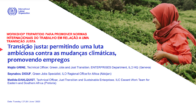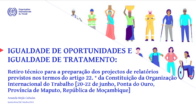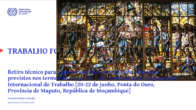Mozambique
The overall objective of the project is to improve labour relations and working conditions in accordance with sustainable development objectives. The project's focus in Mozambique aligns with the country's maritime significance, trade agreements, and regional partnerships, aiming to improve labour standards and promote sustainable development.
Mozambique has been a member of the ILO since 1976 and has ratified eight out of ten fundamental conventions, three governance conventions and eight technical conventions.
The focus of the project in Mozambique is on implementing International Labour Standards (ILS), particularly by supporting actions following the ratification of the Maritime Labour Convention, 2006 (MLC), and promoting the ratification and implementation of other ILO Conventions.
The emphasis on the maritime sector relates to Mozambique’s extensive coastline, which is the fourth longest in Africa, spanning over 2,400 kilometres and rich in fish and seafood. Additionally, over 60 percent of Mozambique’s population resides in coastal areas, and the country hosts three of the top 10 ports in Southern Africa (Maputo, Beira, and Nacala).
Since 2018, Mozambique has benefited from the continuous implementation of the Economic Partnership Agreement (EPA) between the European Union (EU) and the Southern Africa Development Community (SADC). This agreement provides Mozambique with trade advantages, including tariff-free and quota-free access for all its goods. The EU’s integrated approach, such as the PROMOVE initiative, supports trade facilitation measures and enhances the business environment by strengthening government reform capacity within the framework of the World Trade Organization (WTO) and the EU-SADC EPA.
Furthermore, Mozambique is part of the PALOP-TL group, consisting of five Portuguese-speaking African countries (Angola, Cabo Verde, Guinea-Bissau, Mozambique, and São Tomé & Príncipe) and Timor-Leste. The EU focuses on fostering a “Governance Initiative” within PALOP-TL, aiming to reinforce democratic, social, and economic governance, including the implementation of International Labour Standards (ILS).
The project provides support to align national law and practice with ILS, to build the institutional capacity of public administrations, social partners, and other relevant stakeholders to support law reform and reporting, and to strengthen institutional frameworks to facilitate social dialogue and conflict resolution.
The project also promotes the ILO Tripartite Declaration on Multinational Enterprises and Social Policy (MNE Declaration), referenced in the EU Trade for All Policy and the Trade and Sustainable Development chapters of EU Trade Agreements to promote a better uptake of its principles during trade and investment in the extractive sector

Objective
Translating Sustainable Development Goal 8 on promoting inclusive and sustainable economic growth, employment, and decent work for all into action through improved labour relations and working conditions.
Achievements
In Mozambique, significant progress was made in promoting international labour standards and decent work through various initiatives across key sectors. These include:
- Establishing an International Labour Standards Multisectoral Team within the Ministry of Labour and Social Security to support reporting obligations and address the comments of the ILO supervisory bodies.
- Developing and adopting a Road Map for the Maritime Labour Convention, 2006, including through a comprehensive Gap Analysis Report and Matrix of Legislation.
- Building capacity through training sessions on international labour standards, particularly on the Maritime Labour Convention (MLC, 2006) as amended, and sectors such as the extractive industry.
- Launching a website and an online application (app) providing information on the Maritime Labour Convention 2006.
- Engaging in tripartite dialogues and workshops at the national and sectoral levels with a focus on the extractive industry, to promote the Tripartite Declaration of Principles concerning Multinational Enterprises and Social Policy and responsible business practices for the realization of decent work.
- Supporting the Labour Law Reform, including progress on addressing violence and harassment at work, minimum age, minimum wage discussions, and social security institutional arrangements.
- Contributing to the adoption of a new Labour Consultative Commission Decree and proposals to amend the Law on the Rights and Duties of Persons with Disabilities.
- Engaging in tripartite dialogues and workshops at national and sectoral levels, particularly in the extractive and forestry sectors, to promote the Tripartite Declaration of Principles concerning Multinational Enterprises and Social Policy (MNE Declaration) and responsible business practices for decent work.
- Establishing an MNE Declaration Promotion Working Group for the extractive sector within the Labour Consultative Commission, the country’s main tripartite+ social dialogue platform, to strengthen engagement with multinational enterprises.
- Designating eight National Focal Points for the MNE Declaration, responsible for advocacy and promoting the application of the Declaration in Mozambique.
- Approving a Road Map for the promotion and application of the MNE Declaration in the extractive industry, defining steps to ensure effective implementation.
- Approving the Action Plan of the National Focal Points of the MNE Declaration, outlining strategic advocacy actions to advance its implementation in Mozambique.
Activities
In Mozambique, Trade for Decent Work prioritises the following:
- Supporting the implementation of ratified ILO Conventions.
- Strengthening the capacities of institutions, labour inspectors, and social partners on international labour standards and Fundamental Principles and Rights at Work.
- Strengthening the nexus between decent work and trade through engagement and dialogue with Multinational Enterprises.
- Strengthening the capacity of the country to meet its reporting obligations.
The project aligns with the Mozambican Government’s response to the Southern African Development Community’s (SADC) directive, urging member states to enhance their adherence to the ILO’s Fundamental Conventions.
Resources

Informative / Mozambique
Transição justa Mozambique Cabo Verde e Senegal
June 28, 2023

Informative / Mozambique
Retiro técnico – C122
October 28, 2021

Informative / Mozambique
Retiro técnico – C100-111
October 28, 2021

Informative / Mozambique
Retiro técnico – C105
October 27, 2021
Fundamental Conventions and selected International Labour Standards and protocols ratified
Improving compliance with Fundamental Principles and Rights at Work
Ratification of International Labour Instruments
The project convened technical and advocacy meetings with decision-makers, including key ministries, the Consultative Council of the Minister of Labour and Social Security and social partners, to support the ratification of the Maritime Labour Convention, as amended (MLC, 2006). In addition, the project is supporting the ratification of two instruments on occupational safety and health: Occupational Safety and Health Convention, 1981 (No. 155); and its protocol P155 - Protocol of 2002 to the Occupational Safety and Health Convention, 1981; and the Promotional Framework for Occupational Safety and Health Convention, 2006 (No. 187). Besides this, the Project is also supporting the finalization of the ratification process of the Violence and Harassment Convention, 2019 (No. 190). Other conventions have been proposed for ratification by the social partners with Project support and are in different process phases, such as the Work in Fishing Convention 2007 (No. 188); the Migrant Workers (Supplementary Provisions) Convention, 1975 (No. 143); the Migration for Employment Convention (Revised), 1949 (No. 97) and the Convention concerning Vocational Rehabilitation and Employment of Disabled Persons 1983 (No. 159).
Action
- Organized a training on International Labour Standards and the MLC, 2006, as amended
- Supported the Government to ratify international labour instruments
- Support is being provided to ILO constituents for the ratification of four ILO instruments: the Migration for Employment Convention (Revised), 1949 (No. 97); the Migrant Workers (Supplementary Provisions) Convention, 1975 (No. 143); the Work in Fishing Convention, 2007 (No. 188); and the Violence and Harassment Convention, 2019 (No. 190)
Results
- MLC, 2006 ratified (2021)
- Gap Analysis Report of the Mozambican Legislation conducted in light of the Maritime Labour Convention 2006
- Approval of the Matrix of the legislation, and the subsequent revision of the legislation in light of the Maritime Labour Convention 2006
- The ratification of the following instruments is imminent, with the procedure for submission to the ILO ongoing: the Occupational Safety and Health Convention, 1981 (No. 155); the Protocol of 2002 to the Occupational Safety and Health Convention, 1981 (P155); and the Promotional Framework for Occupational Safety and Health Convention, 2006 (No. 187)
- The social partners are actively submitting proposals for the ratification of five key ILO instruments. The Employers’ Organizations have proposed the Work in Fishing Convention (No. 188) of 2007 to the Labour Advisory Commission, while the Workers’ Organizations have presented the Violence and Harassment Convention (No. 190) of 2019 before Parliament. Additionally, the proposals include the Migrant Workers (Supplementary Provisions) Convention of 1975 (No. 143) and the Migration for Employment Convention (Revised) of 1949 (No. 97)
- Convention concerning Vocational Rehabilitation and Employment of Disabled Persons 1983 (No. 159)
- Reform of the labour law
- Integration and improvement of international labour standards into legislations that are pending approval, specially in the labour law regulations
Implementation of ratified ILO Conventions
Supporting the establishment of the International Labour Standards Multisectoral Team to strengthen the government’s capacity to report on ratified conventions
The project supported the creation of the International Labour Standards Multisectoral Team. The team was trained on different ILO Conventions and the reporting procedure of 6 out of 19 ratified instruments such as the Forced Labour Convention, 1930 (No. 29); the Abolition of Forced Labour Convention, 1957 (No. 105); the Equal Remuneration Convention, 1951 (No. 100); the Discrimination (Employment and Occupation) Convention, 1958 (No. 111); the Employment Policy Convention, 1964 (No. 122); the Maritime Labour Convention, 2006 (MLC, 2006), as amended. This training has been instrumental in ensuring the timely submission of the first implementation report of the MLC, 2006.
Action
- Creation of an International Labour Standards Multisectoral Team within the Ministry of Labour and Social Security
- Training on international labour standards and reporting obligations to the ILO supervisory bodies
Results
- Timely submission of the 1st Report on the Implementation of the MLC, 2006
- Formulation of a draft Action Plan for the implementation of ratified international labour instruments
- Development of a website about the MLC, 2006 (Portuguese)
- Development of an application (App) containing FAQs about the MLC, 2006 (Portuguese)
- Timely submission of reports on ratified Conventions to the ILO
Constituents effectively participate in national processes that address gaps between national law and practice and targeted conventions
Strengthening the implementation of international labour conventions
Capacitating ILO constituents to contribute to the strengthening of the national legal framework in light of targeted conventions
The project focused on strengthening the capacity of constituents to contribute to national processes that aim to address gaps between national law and practice and targeted conventions such as the MLC, 2006.
Action
- Trainings on MLC, 2006
- Capacitating ILO constituents to participate in national processes, including labour law reform through trainings and dialogues
Results
- Reform of the national labour law
- Integration of international labour standards into national legislations that are pending approval
- Enhanced participation of ILO constituents in discussions surrounding violence and harassment at the workplace
- Contributions by social partners to the proposals addressing the Law on the Rights and Duties of People with Disabilities
Enhanced collaboration and dialogues between constituents, supply chain actors and trade partners to prompt responsible business conduct in policy and practice
Promotion of the MNE Declaration, particularly in the extractive sector
Enhancing national capacity of the ILO constituents for making better use of the MNE Declaration
The project supported the creation of the Working Group for the promotion of the MNE Declaration in the extractive sector along with the development and implementation of a national action plan for the promotion of the MNE Declaration in Mozambique.
Action
- Tripartite capacity building workshop on the MNE Declaration
- Dialogues organized for the extractive sector on opportunities and challenges for the realization of decent work based on the approach of the MNE Declaration
- Technical assistance for the promotion of the MNE Declaration and the application of its principles in Mozambique
Results
- Increased understanding of the MNE Declaration and its application by ILO constituents
- Development of a roadmap for the promotion of the MNE Declaration in the extractive sector
- Establishment of an MNE Working Group for the extractive sector within the Consultative Labour Commission (CCT)
- Designation of National Focal Points for the application of the MNE Declaration
- Approval of a roadmap for the promotion of the MNE Declaration in the extractive sector
- Approval of the National Focal Points Action Plan for the advocacy and implementation of the MNE Declaration
Enhancing national capacity in relation to the labour dimension of the Business and Human Rights Agenda
The Project supported the preparation of the National Action Plan on Business and Human Rights (NAP). The process is led by the Ministry of Justice, Constitutional and Religious Affairs and involves the following government sectors- Labour, Mining, Oil and Gas, Trade, and Industry. Additional stakeholders include the UNCT (OHCHR, UNICEF, UNDP); cooperation partners and employers’ and workers’ organizations. The project is also focused on integrating the principles of the MNE Declaration into the NAP. This would enable multinational and national enterprises to make a positive contribution to economic and social progress and the realization of decent work for all, including but not limited to the extractive industry.
Action
- Provided guidance to tripartite constituents and businesses in relation to the labour dimension of the business and human rights agenda
- Participation in national dialogues related to the promotion of the business and human rights agenda
Results
- Guidance provided to national stakeholders for the integration of labour and decent work considerations into the national action plan on business and human rights, including references to the ILO Helpdesk for Business and the guidance offered by the MNE Declaration to ensure policy coherence
- Supporting business efforts by promoting the business and human rights agenda through ILO resources, including the labour dimension of due diligence
Linking decent work, trade, and the environment through tripartite engagement on just transition and the green economy
Establishing the nexus between International Labour Standards and a just transition to a green economy
Mozambique is among the countries very significantly affected by climate change. The project has therefore actively supported the mobilization of ILO constituents in the country to contribute to the creation of green and healthy jobs. This effort aims to achieve a just transition and a sustainable future that prioritizes decent work, particularly amidst the challenges posed by climate change.
Action
- Tripartite Workshop to promote international labour standards in relation to just transition
Results
- Raised awareness among tripartite constituents and partners of the concept of a just transition to a green economy in light of international labour standards as a first step
Tripartite constituents effectively fulfil their respective roles in reporting to the supervisory bodies
Building the capacity of ILO constituents to report on ratified international labour conventions
Supporting the drafting and validation of country reports by ILO constituents
The Project focused on equipping the Government to apply the Maritime Labour Convention, 2006 (MLC, 2006), as amended, as part of its capacity-building efforts. Additionally, it also focused on strengthening the country's ability to report on six other international labour instruments that had outstanding reports to be submitted to the ILO supervisory bodies.
Action
- Technical meetings and consultation workshops on reporting obligations for the Government and the social partners
Results
- Timely fulfilment of reporting obligations with no reports outstanding on the Conventions that were focused on during the trainings
Support the establishment and capacity building of a team responsible for drafting reports within the Ministry of Labour and Social Security
The Project supported the establishment of the International Labour Standards Multisectoral Team within the Ministry of Labour and Social Security, which is tasked with the responsibility of enhancing the country’s annual reports to the ILO supervisory bodies.
Action
- Establishment of the International Labour Standards Multisectoral Team within the Ministry of Labour and Social Security
Results
- Built the capacity of the Government to meet its reporting obligations
- Successful submission of the first report on the implementation of the MLC, 2006